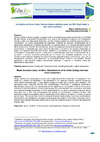Identificador persistente para citar o vincular este elemento:
https://accedacris.ulpgc.es/jspui/handle/10553/123712
| Título: | La música se hace relato: interacciones creativas para escribir (hoy) mejor y leer más (mañana) | Otros títulos: | Music becomes story: creative interactions to write better (today) and read more (tomorrow) | Autores/as: | Sánchez García, Miguel Suárez Robaina, Juana Rosa |
Clasificación UNESCO: | 630105 Lengua y cultura 620306 Música, musicología 570107 Lengua y literatura |
Palabras clave: | Música Creatividad Producción textual Interdisciplinariedad Hábito lectoescritor, et al. |
Fecha de publicación: | 2023 | Publicación seriada: | Revista De Estudos E Pesquisas Sobre Ensino Tecnológico | Resumen: | Música, lectura y escritura juegan un papel crucial en la apertura de canales emocionales. La finalidad de este artículo es presentar la integración en el aula de dos disciplinas mediante una investigación llevada a cabo (con desarrollos diferentes), en dos ámbitos académicos distintos (preuniversitario y universitario). La acción desarrollada da respuesta, mediante las técnicas metodológicas de la observación participante, el análisis documental y la autoevaluación, a la hipótesis del efecto positivo de la música como incentivo de la producción textual. Se programan sesiones de escucha musical, no consecutivas, e integradas por varias fases de desarrollo: una primera de escucha compartida en grupo, una segunda de producción textual individual y una tercera que autoevalúa el grado de concentración, creatividad, emoción y satisfacción experimentado, junto con la identificación de la sensación o emoción preferente provocada por la música. Los resultados evidencian cómo los canales emocionales que despierta la música favorecen especialmente la concentración, y por ello, la introspección necesaria para desarrollar la creatividad textual. Refieren una práctica literaria placentera y una escritura creativa notoriamente mejorada. Y auguran un creciente interés por desarrollar el hábito lector. Music, reading and writing play a crucial role in opening emotional channels. The purpose of this article is to present the integration of two disciplines in the classroom through research carried out (with different developments), in two different academic levels (pre-university and university). The developed action responds, through the methodological techniques of participant observation, documentary analysis and self-assessment, to the hypothesis of the positive effect of music as an incentive for textual production. Musical listening sessions are scheduled, non-consecutive, and made up of several development phases: a first of shared listening in a group, a second of individual textual production and a third that self-assesses the degree of concentration, creativity, emotion and satisfaction experienced together with the identification of the preferred sensation or emotion provoked by the music. The results show how the emotional channels awakened by music favor concentration, and therefore, the introspection necessary to develop textual creativity. They report a pleasant literary practice and markedly improved creative writing. And they predict a growing interest in developing the reading habit. |
URI: | https://accedacris.ulpgc.es/handle/10553/123712 | ISSN: | 2446-774X | DOI: | 10.31417/educitec.v9.2218 | Fuente: | Educitec: Revista De Estudos E Pesquisas Sobre Ensino Tecnológico [ISSN 2446-774X], v. 9 n. jan./dez. (2023), e221823 |
| Colección: | Artículos |
Visitas 10
430
actualizado el 16-ene-2026
Descargas
109
actualizado el 16-ene-2026
Google ScholarTM
Verifica
Altmetric
Comparte
Exporta metadatos
Los elementos en ULPGC accedaCRIS están protegidos por derechos de autor con todos los derechos reservados, a menos que se indique lo contrario.
